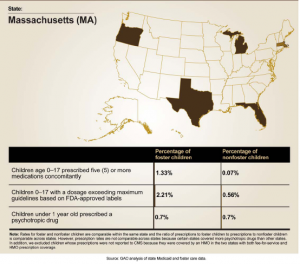The Government Accountability Office (GAO) has been investigating the rates of foster care children taking psychiatric medications in several states (not Vermont). A Senate hearing was held on Thursday December 1 about the issue which was picked up by a number of media outlets.
You can see CNN’s report for yourself. In their typical manner, they paint the issue in the most inflammatory language possible in describing children like “zombies” using “mild-altering medications.” At the same time, the report itself outlines some disturbing practices. Key findings include the following.
- Children in foster care were 2.7 to 4.5 times more likely to be taking psychiatric medications than non-foster care children in the Medicaid system (20-39% of kids in foster care were taking psychiatric medications with Massachusetts having the highest rate). OF NOTE, however, this same report cites data that up to 57% of children in foster care have been diagnosed with a psychiatric disorder with other studies showing rates that are even higher.
- Up to 2.1% (in Florida) of children under the age of one were taking a psychiatric medication. OF NOTE, however, the “vast majority” of the medications were antihistamines or benzodiazepines that were likely used for nonpsychiatric purposes, such as allergies and medical procedures.
- Up to 1.3% (in Massachusetts) of children in foster care were taking 5 or more psychiatric medications. OF NOTE, however, the report looked at all prescriptions in 2008 and uses the term “concomitant” without the ability to differentiate between a child truly taking multiple medications at the same time and stopping one medication for another within the same calendar year.
The report compared medication usage to the best practice guidelines from the American Academy of Child and Adolescent Psychiatry (AACAP) along four principles including 1) obtaining informed consent, 2) oversight procedures, 3) consultation with a child psychiatrist, and 4) information sharing. Most states were lacking in at least some of these areas. The report recommends that although states now are tasked with developing their own protocols for monitoring psychiatric medication in foster care children, nationwide guidelines may be useful. AACAP issued a statement supporting GAO’s recommendation that there be formal guidelines issued to state welfare agencies on best practices for using psychiatric medications in this population. The statement further noted that “medication alone is rarely an adequate or appropriate intervention for children and adolescents with complex psychiatric disorders, including those in the foster care system.
What should we make of this? Well, first is READ THE FINE PRINT before going on television and making sweeping and provocative conclusions. While it is alarming that any infant is taking a psychiatric medication, it is likely that about 80% of those prescriptions were for non-psychiatric reasons. More importantly, however, the report does indicate some gaps in taking care of some of our most vulnerable children. Medications are sometimes used as a shortcut when other useful interventions aren’t available. One measure that could definitely help cut down the number of medications children in foster care receive, for example, would be to ensure that all of them have ready access to intensive evidence-based psychotherapy. These kids deserve our protection and our advocacy.

